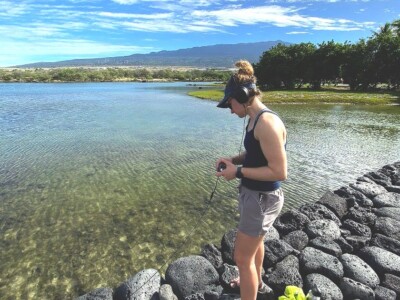Donald A. Rakow has good news to share: “Spending time in nature benefits us no matter our age.”
Rakow, associate professor of plant science at Cornell and director of the NatureRx@Cornell program, also served as director of Cornell Botanic Gardens from 1996 to 2013. In 2019, Rakow and his colleague, the late Gregory T. Eels, co-authored the book Nature Rx: Improving College-Student Mental Health.
Since publication of the book, Rakow and other researchers have continued to quantify the health benefits of time spent in nature and share this message with the Cornell community and communities across the country.
On March 25, Family and Children’s Service (F&CS) of Ithaca, a non-profit that provides mental health and social services to children and families in the Ithaca area, invited community members to learn more about Nature Rx and Rakow’s research to measure the positive impacts of time spent in nature.
“The book and benefits are not just for students, but for all community members.”—Karen Schachere, former director of clinical services at F&CS
Just a spoonful of nature works wonders
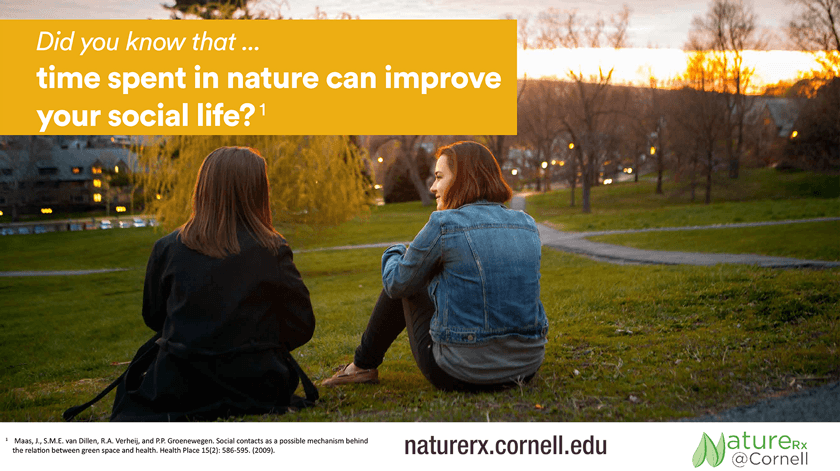
An interdisciplinary Cornell research team reported in January 2020 that as little as 10 minutes in a natural setting can help college students feel happier and lessen the effects of both physical and mental stress. “It doesn’t take much time for the positive benefits to kick in—we’re talking 10 minutes outside in a space with nature,” said lead author Gen Meredith, associate director of the Master of Public Health Program and lecturer at the College of Veterinary Medicine. The story attracted more than 34,000 views, making it one of the most-read Cornell Chronicle stories of the year.
Rakow explained that the Cornell team conducted an extensive review of the literature on the subject. They found that as little as 10 to 20 minutes two or three times per week was enough to reduce salivary cortisol levels (a key marker of stress levels), lower blood pressure and heart rate, and improve participants’ moods.
Rakow cited other research that shows that the greatest effect on stress markers happens after a 20- to 30-minute exposure to nature. “Nature should never be seen as a cure-all,” he cautioned, “but experiences in nature benefit us in multiple ways and offer a non-pharmacological alternative to improve our mental health.”
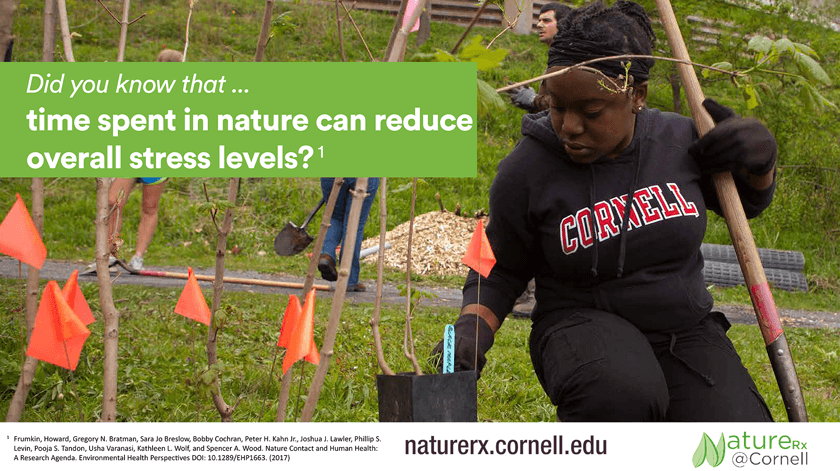
He asserted that the benefits hold true across all age groups: from children, to young adults, to seniors. “All people benefit from time outdoors in nature,” he said, adding, “Let me repeat: all people.”
Rakow stressed that the benefits can happen close to home, in your own backyard, and they can involve both active and passive outdoor time. “A wealth of evidence in recent years shows that being active in nature, just sitting outside in nature, or even looking at a picture of nature have benefits to your overall wellbeing,” he said.
This is not a new idea

Rakow said that thinkers as far back as Aristotle recognized the salutary benefits of time spent outdoors. In On the Parts of Animals, Aristotle said, “In all things of nature there is something of the marvelous.”
USDA social science researcher, Dr. Michelle Kondo, has documented that time in nature was prescribed in the late 1800s to treat underweight children and patients with rickets and polio. Though our health challenges have changed over the past 125 years, Rakow said that time in nature is also effective in treating modern maladies, such as obesity, diabetes, and depression.
Rakow grouped the health benefits of time spent in nature into three categories: psychological, physiological, and attitudinal.
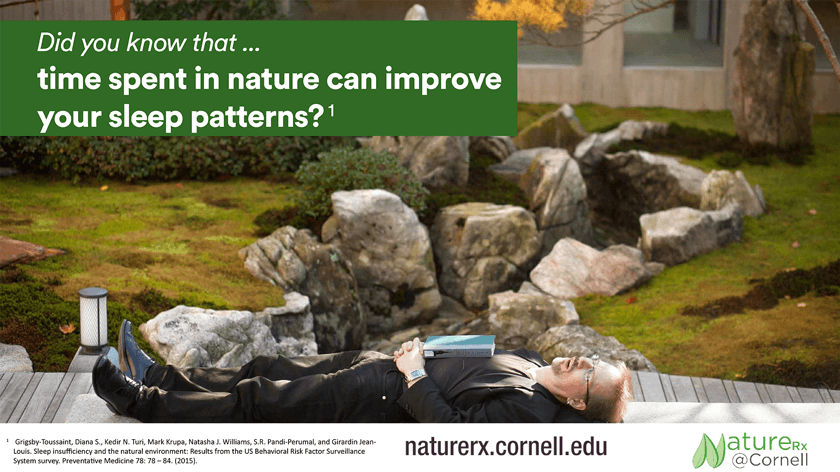
Psychological benefits include reduced stress, anxiety, and depression. Physiological benefits include improved concentration and cognitive function, pain control, and faster recovery time from injuries. Attitudinal benefits include greater happiness, life satisfaction, reduced aggression, and better social connections.
Rakow cited numerous studies that document these benefits across all demographics. He and his colleagues have shown that time in nature can improve learning outcomes for school children, improve mental health, foster social connections, and “melt away tensions and aggressions.”
He believes that time in nature and the multiple benefits it provides are especially needed now. “Since the start of the pandemic, all of us have developed such a great dependence on technology, that time in nature takes a back seat,” he said.
“Cornell has a spectacularly beautiful campus, but I notice that students are often oblivious to it.”
—Don Rakow, director of NatureRx@Cornell program
Spend a little more time outdoors
Rakow said that Cornell Health has been including prescriptions for nature in its treatment recommendations for students since 2018. Staff are following up with the students to see how time in nature has impacted their overall stress levels and academic performance.
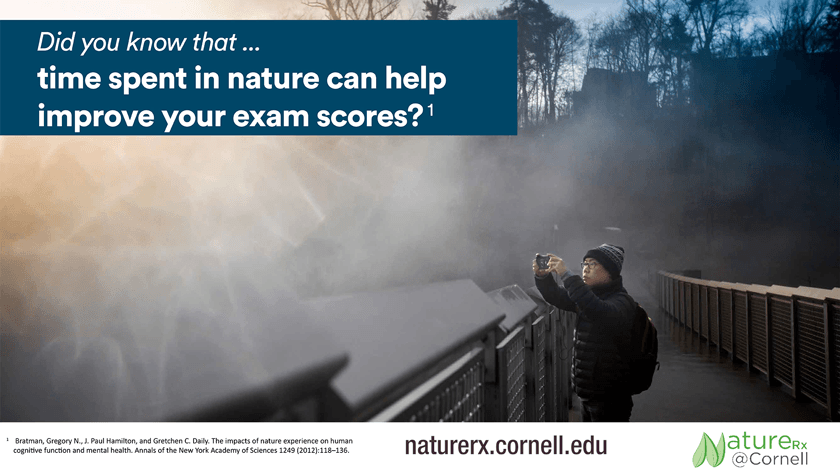
Rakow and his team have also created posters to remind students that time in nature can positively impact everything from their stress levels, to their exam scores, to their sleep habits. The NatureRx@Cornell website includes a list of 16 natural areas located on or in close proximity to the Cornell campus. “We want students to recognize that nature is nearby and doesn’t take long to access,” he said.
For adults, Cornell Botanic Gardens offers a Mindful Botany program. Once a month during the growing season, a staff member leads participants on the same walk, so that they can closely observe seasonal changes in the landscape. “They experience phenological changes in trees, plants, insects, and birds,” Rakow explained. “Talking is limited and we encourage deep observation,” he added. This program will resume after the pandemic.
Rakow encouraged everyone to get outdoors this spring to enjoy the many natural areas, gorges, and state parks in the Ithaca area. And for those blustery days when most of us would prefer to stay indoors, he says that houseplants can also help to lift the spirits. “Greening the interior with houseplants can positively impact mood, especially in winter when people are affected by Seasonal Affective Disorder,” he said.

In closing, Rakow reminded the audience to be patient, both with winter and with the pandemic. He urged everyone to get vaccinated so that as the weather warms and we all head outdoors, we can do so safely.
“One of great ironies of the past year is that people have shown much greater interest in spending time outdoors—but in many cases our outdoor areas have become so crowded that it’s become difficult to be in them and safely social distance,” he said. “I hope that people’s interest in being outside continues and that we’ll feel more comfortable being in crowds as we all get vaccinated.”


